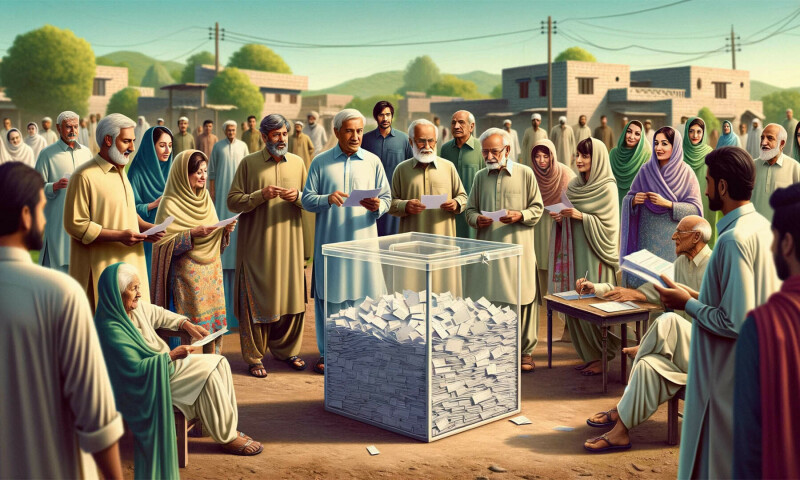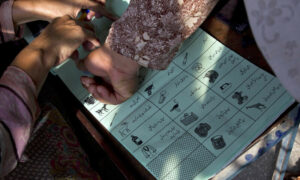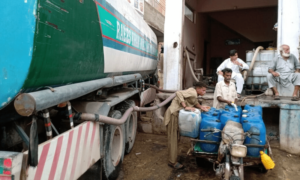Readers also doubt integrity of past elections; see economy as primary challenge for Pakistan but doubt elected officials’ ability to tackle it.
A majority of Dawn.com readers say they will vote in the forthcoming general elections that will be held on February 8, despite expressing little trust in the electoral process, according to the results of a survey that was run on the website from Jan 2-4.
Nearly 6,000 readers participated in the non-scientific survey. After cleaning up the data by removing incomplete or invalid entries, there are more than 5,500 respondents, over three-quarters of whom fall within the ages of 18-40.
Survey respondents are mostly from Pakistan (84 per cent) — predominantly from Punjab and Sindh — with notable participation from overseas Pakistanis with voting rights in Pakistan (nearly 16pc). The largest proportion of respondents are male (89.4pc), followed by female (10.24pc), and other (0.36pc). The distribution of opinions is relatively consistent across genders.
The questions of the survey focus on determining voter sentiments and gauge whether the prevailing political and economic situation will affect their intent to vote. It also seeks to learn what issues they believe are the most important for the country.
Key takeaways from the survey
-
The survey reveals respondents’ willingness to vote despite scepticism regarding the election process
-
Distrust in the media’s role in providing impartial and accurate election coverage emerges, crossing gender lines
-
Economic growth and employment stand out as paramount concerns among respondents, but doubts linger of elected officials effectively tackling unemployment and poverty
-
While there are subtle differences in issue prioritisation among demographic groups, the core concerns remain consistent
Socio-political context of the survey
Pakistan finds itself at a crossroads during a time rife with economic and political challenges. The country’s recent narrative has been one of struggle, particularly in the economic realm where inflation has soared alarmingly, touching the daily lives of its people in the most tangible ways. Prices continue to climb, eroding the purchasing power of the citizens, and casting a pall of uncertainty over the nation’s path forward.
In parallel with these economic hardships, the political scene remains turbulent. The much-anticipated general elections, which were supposed to have taken place three months after the National Assembly was dissolved on Aug 9, are taking place on Feb 8, nearly six months later. But there are still elements who seek to delay the polls, deepening concerns about the very fabric of democracy and governance.
The survey intends to gauge the perceptions of our readers, and if and to what extent their voting preferences are affected by the circumstances.
You can find the detailed analysis below.
Will you vote in the upcoming general elections?
Nearly two-thirds, specifically 64.96pc, of the respondents are prepared to cast their votes in the imminent general elections. However, a notable 35.04pc expressed their intention to keep away.
The predominant reason for this reluctance, cited by 62.69pc, is a belief that their vote won’t make a difference. This is followed by 20.41pc who feel disenchanted with all candidates. Practical issues like transportation challenges or childcare (7.76pc), as well as a lack of information about the election process (5.13pc) or not being registered to vote, are less common reasons but still notable.
Do you think the Nota (none of the above) option should be part of the ballot?
A significant ratio of the participants, just under two-thirds (64pc), believe a Nota (none of the above) option should be a part of the ballot. Those who disagree with the suggestion are 35.91pc of the respondents.
According to the Pakistan Institute of Development Economics, a Nota is an option on the ballot in some countries which is designed to allow voters to indicate disapproval of all the candidates on offer for an election cycle.
The support for Nota is consistent across age groups, with the 25-40 years group showing the highest number of supporters. Both males and females predominantly support the Nota option, with males having a higher absolute number of supporters due to the larger number of male respondents. The support for Nota is also consistent across different locations, indicating a widespread appeal for this option among different geographical areas.
Which party do you currently support?
The survey paints a stark picture of readers’ confidence in the PML-N-led Pakistan Democratic Movement (PDM) government, which was in power until August last year. A significant 76.34pc of those surveyed have labelled the PDM’s performance as ‘very poor’, with only a mere 1.28pc viewing it as ‘excellent’.
Interestingly, the main beneficiary of this public discontent appears to be the PTI, led by former prime minister Imran Khan. Garnering support from 67.33pc of the respondents, PTI stands ahead — across all demographics — of the PML-N, which has managed to secure only 16.38pc support. The PPP, too, finds little support in the survey, with only 9.5pc of the respondents in its favour.
The presence of respondents with no political preference (3pc) indicates a portion of the participants is either disengaged or dissatisfied with the current political options.
When asked to reflect on the PTI government’s tenure from 2018 to 2022, the opinions are mixed.
Overall, the opinions on the performance of the PTI are quite diverse, with a significant number of respondents rating it as ‘neither good nor bad’ indicating ambivalence or mixed feelings about the government’s performance.
Age-wise, the sentiment seems relatively consistent across different age groups, with ‘neither good nor bad’ being the most common response, followed by ‘good’ and ‘excellent’.
Gender-wise, the distribution of ratings is similar among males and females, with a slightly higher number of males rating the government’s performance as ‘good’ or ‘excellent’.
Location-wise, respondents from Punjab and Sindh gave the most ratings, reflecting a higher level of engagement or interest in evaluating the government’s performance. The responses vary, but
‘neither good nor bad’ tends to be a common sentiment across locations.
Which social media platform are you following for the party you support?
The survey also sheds light on the role of social media in political engagement. X (Twitter) is the most popular platform for following political parties, indicating its significance in political discourse and information dissemination.
Facebook and YouTube are also highly favoured, suggesting a diverse range of platforms being used for political content consumption.
A notable number of respondents (896) mentioned ‘none’, indicating they do not follow any party on social media, which might reflect a disengagement from political discourse on these platforms or a preference for other sources of information.
Instagram and TikTok show their relevance in political communication, especially potentially among younger demographics.
Which past election in your opinion was held successfully?
The survey also sought opinions on past elections. A significant number of respondents (46.39pc) believe that none of the past elections were held successfully, indicating a level of scepticism or dissatisfaction with the electoral processes in the past.
The 2018 election is believed by many respondents (34.79pc) as having been held successfully, suggesting a perception of relative fairness in that particular election.
The 2013 (11.56pc) and 2008 (7.26pc) elections also received notable mentions, indicating that a portion of the respondents viewed these elections as successfully conducted.
Do you think the ECP is doing enough to ensure free and fair elections?
The findings raise concerns about the perceived integrity of the upcoming elections. An overwhelming 89.11pc doubt the election commission’s efforts in ensuring a free and fair election.
Furthermore, 79.08pc are ‘not at all satisfied’ with the current level of election transparency, another 10.32pc are dissatisfied, while only 2.54pc are satisfied and 1.35pc very satisfied.
This scepticism extends to the potential reflection of the public’s will in the election results, with 62.45pc expressing doubts. Another one-fifth picked slightly. Only 2.93pc of respondents believe the results will reflect the will of the people ‘a great deal’.
Trust in media at a low ebb
Trust in the media for unbiased election coverage appears to be at a low ebb, with a significant chunk of the respondents, 45.83pc, expressing complete distrust. Another 30pc only slightly trust the media. Those who say they have moderate trust in the media are 16.4pc, while those who have confidence in the media for unbiased coverage cumulatively, just above 7pc.
Which issue do you think is the most important facing Pakistan today?
The survey identifies economic growth and employment as the most pressing issues, chosen by 46.35pc of respondents. Economy was followed by corruption (21.31pc), human rights (15.27pc), education (7.29pc) and security (3.41pc).
However, there’s a prevailing belief, shared by 62.21pc, that the upcoming elections might not adequately address these concerns. Under a fifth of the respondents agree, while 18.3pc don’t know.
Are you concerned about election related violence?
On the topic of election-related violence, there is significant apprehension among the populace, with 44.49pc being ‘very concerned’ and an additional 32.16pc ‘somewhat concerned’. The level of concern varies by age, sex, and location, but the dominant sentiment across all demographics is a high level of concern, with ‘very concerned’ being the most frequent response.
Less faith in future elected officials
The survey reveals that a significant number of respondents have little to no confidence in elected officials’ ability to address poverty and unemployment, with the majority of responses falling under ‘not at all’ and ‘slightly’.
Nearly 42pc of respondents have picked ‘not at all’ and 30.42pc have picked ‘slightly’ in the question about poverty. Just under a fifth of the participants (19.42pc) moderately believe elected officials will be able to address poverty, while just 5.31pc and 2.94pc believe elected representatives will be able to face the challenge.
Similarly, a majority of participants don’t believe at all that elected officials will be able to deal with unemployment. Over 43pc have chosen ‘not at all’ while another 29.41pc have picked ‘slightly’. The readers who have faith in future elected officials are under 9pc.
The lack of confidence in the effectiveness of elected officials extends to a question on whether elected officials will be able to practically address any of the listed issues. A significant portion (68.31pc) say ‘none of the above’.
Nonetheless, the economy is perceived as the issue that elected officials are most likely to address successfully, followed by corruption and education. This suggests that respondents see these areas as within the realm of practical policymaking.
Climate change is also acknowledged, but with fewer respondents believing it will be practically addressed compared to other issues, possibly indicating a perception that it’s a more challenging or less prioritised issue.
Importance of party stances
The bulk of the responses on prioritising the fight against corruption is distributed among the extremes of ‘extremely important’ (35.49pc) and ‘not important’ (30.4pc), signifying a divided opinion on the matter among our readers.
On the question of party stances on issues determining their voting habits, the respondents rank the economy as the highest, followed by corruption, education and climate change.
Doubt in manifestos
The survey also reveals that respondents are sceptical of political parties’ manifestos. More than half (50.6pc) of the participants don’t believe that manifestos are reflective of parties’ intentions, while another 22.81pc express only slight belief in them.
Addressing this mistrust and improving the credibility of party manifestos could be pivotal in garnering voter trust and engagement.
To sum up
Amidst a landscape marked by doubt — over the electoral process and the media’s commitment to impartiality — there’s an unmistakable determination among many across demographics and location to engage with democracy and cast their votes. This balance of scepticism and resolve paints a picture of a nation at a crossroads.
Disclaimer: Dawn.com’s “Pre-election survey” was meant to gauge public sentiment ahead of the elections. Participation was voluntary and open to all visitors to the Dawn.com website between Jan 2, 2024 and Jan 4, 2024. The survey was not controlled and the sampled responses may not be representative of the larger population.







